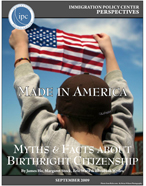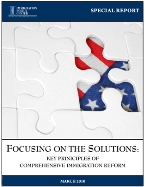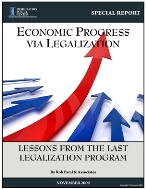 By James C. Ho, Margaret D. Stock, Eric Ward, and Elizabeth B. Wydra
By James C. Ho, Margaret D. Stock, Eric Ward, and Elizabeth B. Wydra
The Fourteenth Amendment to the Constitution is enshrined in U.S. history as the cornerstone of American civil rights, ensuring due process and equal protection under the law to all persons. Equally important, however, is the Fourteenth Amendment’s affirmation that all persons born or naturalized in the United States and subject to its jurisdiction are, in fact, U.S. citizens:
All persons born or naturalized in the United States and subject to the jurisdiction thereof, are citizens of the United States and of the State wherein they reside. No State shall make or enforce any law which shall abridge the privileges or immunities of citizens of the United States; nor shall any State deprive any person of life, liberty, or property, without due process of law; nor deny to any person within its jurisdiction the equal protection of the laws.Read more...
Published On: Tue, Sep 15, 2009 | Download File





